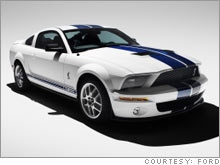|
Shelby test drive: Can a Mustang be worth this much?
It's a good thing the Shelby GT500 has a supercharged engine. It's got a lot of baggage to carry.
NEW YORK (CNNMoney.com) - I wanted to know if the Shelby GT500 could possibly be worth the kind of money that people are already lining up to pay. Its sticker price is $43,000 for the hard top - but buyers are offering to pay dealers $20,000 to $30,000 more than that. So I called an expert on the matter and, to get a really good handle on the situation, I borrowed a pre-production car.
Steve Davis, vice-president of the collector car auction company Barrett-Jackson, currently owns a rare supercharged 1967 Shelby GT350. He also co-owns the "Green Hornet," the test vehicle that sports-car maker Carroll Shelby used in the 1960s to try out some of his engineering ideas. He has owned and sold other classic Shelby cars over the years. If someone wants to pay that kind of money, he said, they're not making a dollars-and-cents decision. This is about passion and memory. Unlike the regular Mustang or even the Camaro or Challenger, cars that a corporation could easily revive, the Shelby GT500 required that Carroll Shelby and Ford reunite. This was a car that, easily, might never have been. So, there are buyers with money to spare who want to be the first to own one. (Davis himself is among them. He'll take delivery of his GT500 soon.) "Wait till you drive it," he said. So I turned the key on a white GT500 coupe with blue racing stripes. It started with a growl, like I'd jabbed it with an ice pick. But then it settled down into a perfectly nice, almost family-friendly, V-8 engine sound, surprising for a car with a 5.4-liter 500-horsepower engine. But I missed the deep, throaty grumble of the 300-horsepower Mustang GT. Stomp hard on the GT500's gas pedal and a three-part muscle-car chorus starts blaring inside the cabin. There's the engine, of course, screaming at full volume. Then the supercharger's high-pitched whine. From behind comes the sound of the rear tire treads raking across dry pavement clawing for some traction. Eventually, either your right foot or the car's own traction control system will ease off the gas just enough to give the back wheels a fighting chance. Then things really get going. The GT500's front end rises as its weight shifts rearward. In a quick few seconds the letters SVT, the logo for Ford's Special Vehicles Team, light up in orange on the tachometer, warning you that you're about to hit the big V-8's redline at a little over 6,000 rpm. Push in the clutch, shift to second, and it all starts again. The rear wheels break loose once more, shredding themselves against the asphalt while the supercharger whine builds inside the cabin. The GT500's 500-horsepower is obviously excessive. But that's what this car is all about. Scorching acceleration and more power than you'll ever need. That rush does come at the expense of weight, however. The GT500 weighs about 430 pounds more than a regular Mustang GT with its plenty-quick 300-horsepower 4.6 liter V-8. And nearly all of that added weight is up in front, under a hood that's bulged up to make room for the supercharger. Still, nose-heavy as it is, the Shelby GT500 does not handle poorly at all. Suspension changes compensate for the weight. Throw it around some turns and it never comes unhinged. But it's a very different experience from the standard Mustang GT. That car, which can be tossed about with ease, is more fun on a twisty road. The GT500 feels bigger and steadier. It will turn hard, but it doesn't feel as eager. All Mustangs have solid rear axles, a rarity in cars these days. That makes for some ride-and-handling quirks, most notably a sideways shimmy over little mid-turn bumps. In other Mustangs, I find it attractive, a part of the muscle-car experience. In the GT500, with more weight, more power and firmer suspension, the effect is much more pronounced. Hit a big bump in the road and it really throws the GT500 around. For those with a big appetite for power, though, it's easy to see that the Ford Shelby GT500 is well worth its $43,000 sticker price. That's $10,000 more than a regular Mustang GT loaded with options. Drop in a huge engine - essentially, it's a cheaper iron version of the aluminum engine in the $180,000 Ford GT sports car - then do what's needed to make that work in a Mustang and you've got a winning formula. Add on a Shelby badge, with the instant respect it carries and you've easily got an extra $10,000 in real value. Yes, the interior is still made from cheap hard plastic, although some of it is covered over with leather. But Ford isn't passing this off as a luxury car. You're paying for what's under the hood and the name on the trunk lid. Ford will be making 8,000 to 10,000 of these cars per year for at least a couple of years. While it will probably never sell for less than sticker price, those who wait will certainly be able to get one for something approaching it. If you aren't lucky enough to be an owner, console yourself with this: Owners will get the most enjoyment out of it on a track. The 300-horsepower Mustang GT is at least as much fun, maybe more, where you and I drive every day, on the public roads. It's plenty powerful, light, cooler-sounding at idle and quieter and smoother at speed. If you want the Shelby, wait a while. You'll pay less for it and it will still be great. But, for my money, I'll take the Mustang GT. On a dollar-per-smile basis, it remains unbeaten. Gallery: |
|

